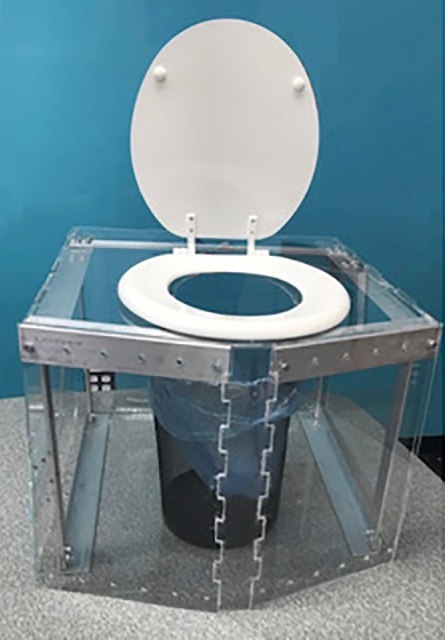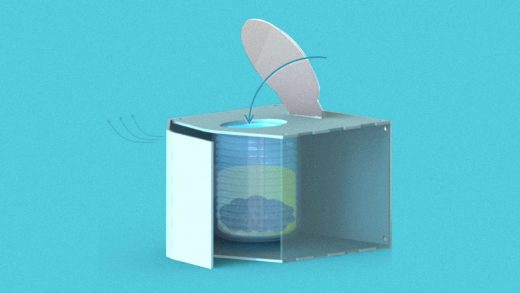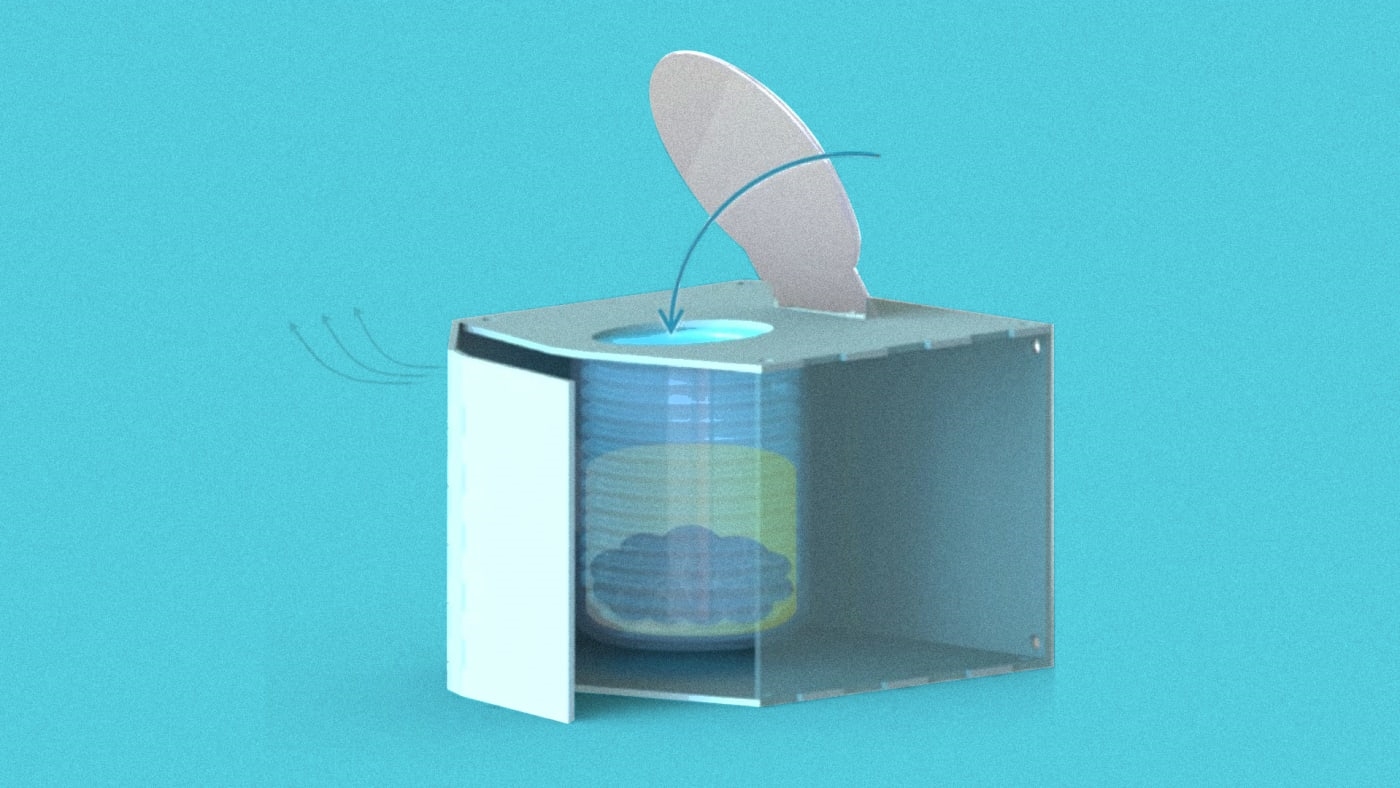This Toilet Vaporizes Poop To Solve Sanitation Problems
As the classic tech lore goes, some of the industry’s best inventions started out in a garage. Diana Yousef’s currently sits in a shed in her backyard in Boston because it could use a bit more privacy. Yousef is the founder and CEO of change:WATER Labs, which has developed a waterless toilet that can basically vaporize your poop.

The contraption resembles a traditional toilet that’s set atop a box with a side vent. Inside there’s a collection drum that’s lined with a pouch made from a proprietary moisture-wicking polymer. As excrement goes in, the polymer sucks the water out, dehydrating the sewage while releasing water vapor. The process isn’t entirely stink-free, but the rapid separation of solids and liquids tends to snuff out much of the odor, and there’s an additional filter inside the box. “This would be a way to have essentially like a self-flushing toilet,” says Yousef. The science has spawned its own catchy tagline. “We lovingly call this material ‘shrink wrap for crap,’” she says.
Poop, after all, is about 75% water (and pee even more so). By transforming normal bowel movements into tiny dried turds, the device enables multiple uses without immediate maintenance. It’s a potentially breakthrough way to provide better sanitation services to the roughly 2.6 billion people who don’t have access to toilets in the developing world.
Typically, rudimentary sanitation service in the developing world takes two forms. There are composting toilets, which require lots of space and are smelly, or personal bucket-based systems and larger pit latrines, the contents of which must be continuously collected and carted away by health workers.
To that end, change:WATER Labs doesn’t consider itself just a toilet company. It’s a “sewage logistics optimization business,” Yousef says. For the average family of five or six, each change:WATER Labs pouch is expected to last at least two weeks before it must be emptied, and the company is working on a larger variation that would double that. That means waste management services have to make fewer pickups, saving time and money. The evaporative toilet is somewhat modular, with interior plumbing that can be easily swapped out while your unit goes in for cleaning. Each pouch is currently disposable and intended to be thrown out once it’s removed, but Yousef is working on how to repurpose or recycle the material to create a closed-loop system. For now, replacements, depending on capacity needed, will range from $3 to $15 each.
Yousef, who is a structural biologist, founded the company in 2013 after working for various outfits interested in taking lab breakthroughs to market, including McKinsey; the World Bank and United Nations; a clean tech VC firm; and as an advisor to an accelerator that was a partnership between NASA and USAID. Initially, she wanted to form a product accelerator using the practice of frugal innovation to translate emerging technologies into inventions that might benefit developing countries. “I thought initially we’d be this platform where we’d connect the dots between technologies and applications across borders, and we try to solve these problems that nobody was really solving or at least nobody was successfully solving,” she says.
The problem was, she didn’t have a proof of concept. So she re-geared, focusing on breathable materials that could passively evaporate water as a clever water treatment innovation, something she’d studied with NASA and USAID. With her structural biology expertise, Yousef realized that the right material could remove not just the water, but also leave behind dirt, grime, and all of the contaminants to which it’s been exposed. Eventually she created a composite material that brings together a couple of different polymers. (The exact recipe is a secret.) The membrane is triggered to absorb and vent by the difference in humidity between the wet and dry side of the membrane.
Yousef thought about applications that aligned with her own values. First, her parents were from the Middle East, so she was aware of the sanitation trouble there. Second, she has two daughters, and wanted her company to somehow address female empowerment. She also became appalled after reading that women at some Syrian refugee camps didn’t feel safe using public toilets. “That became this sort of lightbulb,” she says. “This is the thing that deals with … sustainability and climate change, and girls’ empowerment, so I just went all in.”
The company, which incorporated in 2015, has built and tested a prototype toilet. Various grants and awards account for $250,000 in total funding. The project may have started out in Yousef’s kitchen (and then moved outside) but she is now collaborating with MIT’s D-Lab, an organization focused on the discovery, design, and dissemination of cost-effective solutions to fix global poverty.
This spring, the company plans to partner with Community Rebuilds, a nonprofit that builds sustainable housing for low-income and Native American communities in Arizona and Utah, It will be testing between 10 and 20 units at households in Moab, and the Hopi Indian Reservation. The toilets, which may have different capacities based on where they’re installed (say, a private home versus a public restroom) should retail for between $200 and $350.
Yousef also foresees many other applications for her membrane. On the industrial and commercial level, this material could be applied as a wastewater treatment to filter out pharmaceuticals, dyes, or medical waste. There’s also the potential for off-grid desalination projects, which could provide more clean drinking water to those in need.
Meanwhile, other international aid organizations have also expressed interest. Earlier this year, Yousef’s concept was announced as a finalist for the Cartier Women’s Initiative Awards. In April, she’ll be pitching it to an international jury for the possibility of securing up to $100,000 in additional funding. The company is also the U.S. representative among 27 international finalists vying for a share of the $1 million Chivas Venture, a social impact competition by Chivas Regal, plus an additional $200,000 that will be awarded this month to the fan favorite through online voting (full disclosure: Fast Company was a partner of the Chivas Venture awards in the past). If all goes well, Yousef expects to begin selling models in early 2019.
Corrections: This post has been updated to reflect the correct water percentage of poop. Additionally, the Native American communities where the pilot will be located have been updated.
(39)



